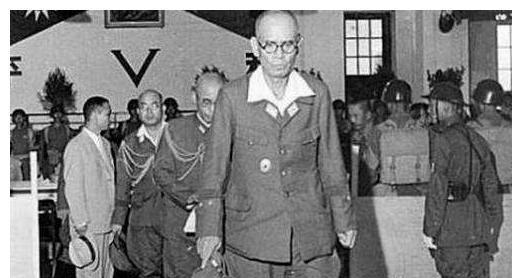Okamura Ningji was once the commander-in-chief of the Japanese army invading China, committed numerous crimes in China, but it was such a person who actually escaped punishment after the end of the war and died of illness in Tokyo, Japan in 1966, which is also a matter that makes many Chinese people feel indignant. Even some generals in our army commented that he was "a difficult opponent."

However, in the memoirs written by Okamura Ningji in his later years, he did not admit that he implemented the "three-light policy" against North China, but instead another "three-nos policy", which was "no killing, no robbery, and no adultery", mainly to paralyze the anti-Japanese army and people, so that they could eliminate the vigilance of the Japanese army, and in Okamura Ningji's memoirs, there was also a way to judge the good security behind the enemy lines, that is, to observe whether there were Chinese girls walking on the streets where the Japanese troops were stationed, and if there were any, it meant that the public order was good.
After the end of the War of Resistance Against Japanese Aggression, Okamura Ningji, on behalf of all the Japanese troops invading China, signed the surrender document, and then was put under house arrest, and according to the rank, Okamura Ningji was undoubtedly a proper Class A war criminal, but after the end of the war, he was not punished, but as a secret military adviser to the Kuomintang authorities, he returned to Japan after the 1960s.
However, it is said that in addition to his memoirs, Okamura Ninji himself also wrote many articles, which were written when he was a secret military adviser in China, most of which were written around 1946, and were written by Kuomintang officers when Okamura Ningji was under house arrest in Nanjing, including "Mao Zedong's Art of War and Countermeasures", "Looking at the Chinese Army from a Hostile Standpoint", and "Annihilating the Communist Army with Concentrated Forces".
According to his own description, these articles were all wasted a lot of his painstaking efforts, especially "Looking at the Chinese Army from a Hostile Stand" and was painstakingly edited and revised several times, but these articles were not left behind later, and almost no one saw them, and after these articles were written again, they were quickly sent to the hands of Chiang Kai-shek and He Yingqin, and the manuscripts that survived in Okamura Ningji's hands were also burned when he left China, and did not exist. Of course, when writing these articles, He Yingqin also promised not to show them to others, so the people who saw them were limited to Chiang Kai-shek, He Yingqin, and the author himself, Okamura Ningji.
Later, when He Yingqin went to Japan to visit Okamura Ningji in 1956, the two mentioned the article of that year during their conversation, and Okamura Ningji said: "I mentioned in it that the Chinese army was the strongest in the past, followed by Russia, Britain and the United States. He Yingqin also reflected: The strongest Chinese army could not defeat the Japanese army because the main senior generals of the various armies did not study enough. Most of these articles, from Ninji Okamura's entry into the Japanese army as a junior officer, until the end of the War of Resistance, are mostly his experiences and lessons learned from the Eighth Route Army in the North China Battlefield.